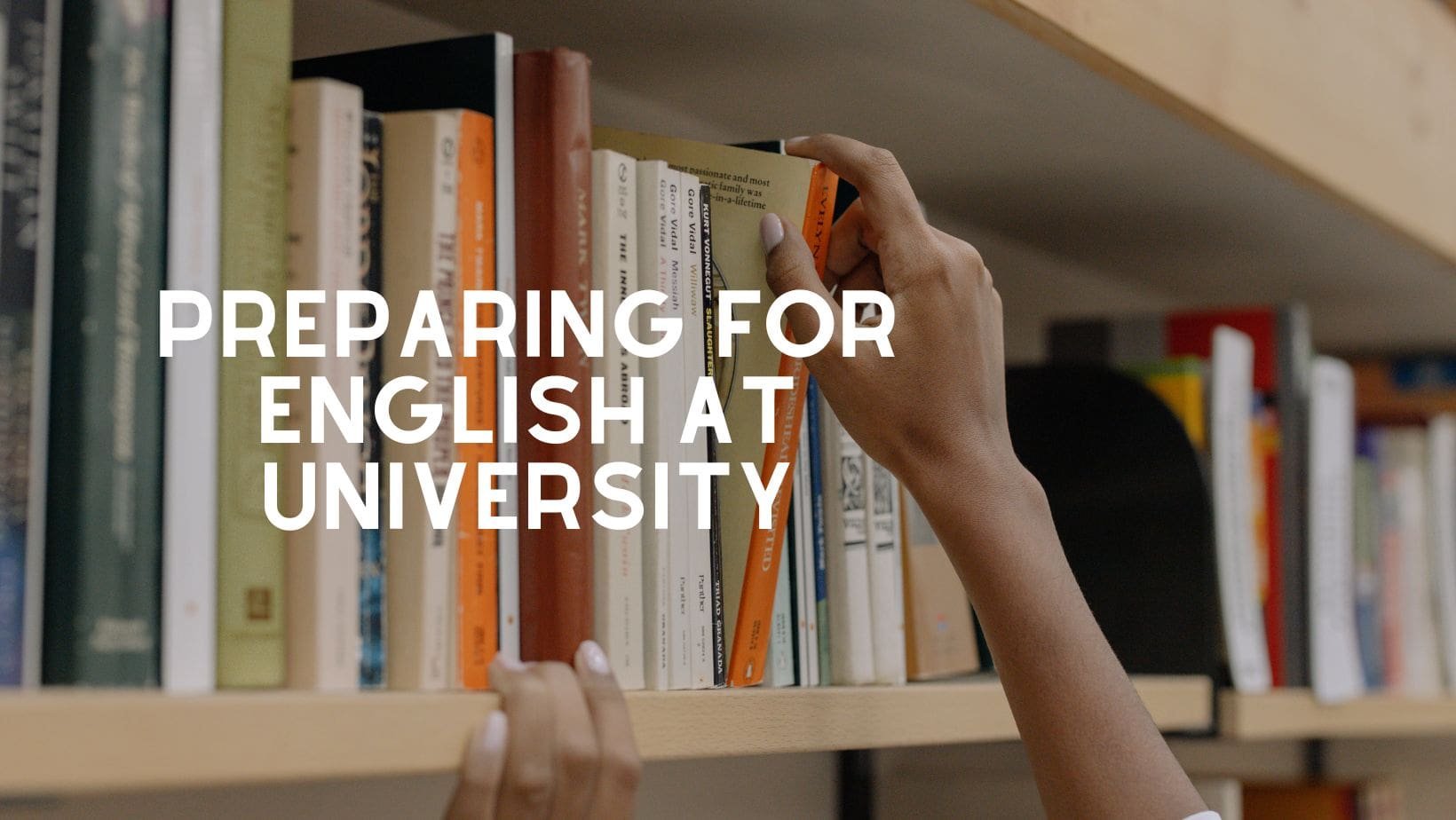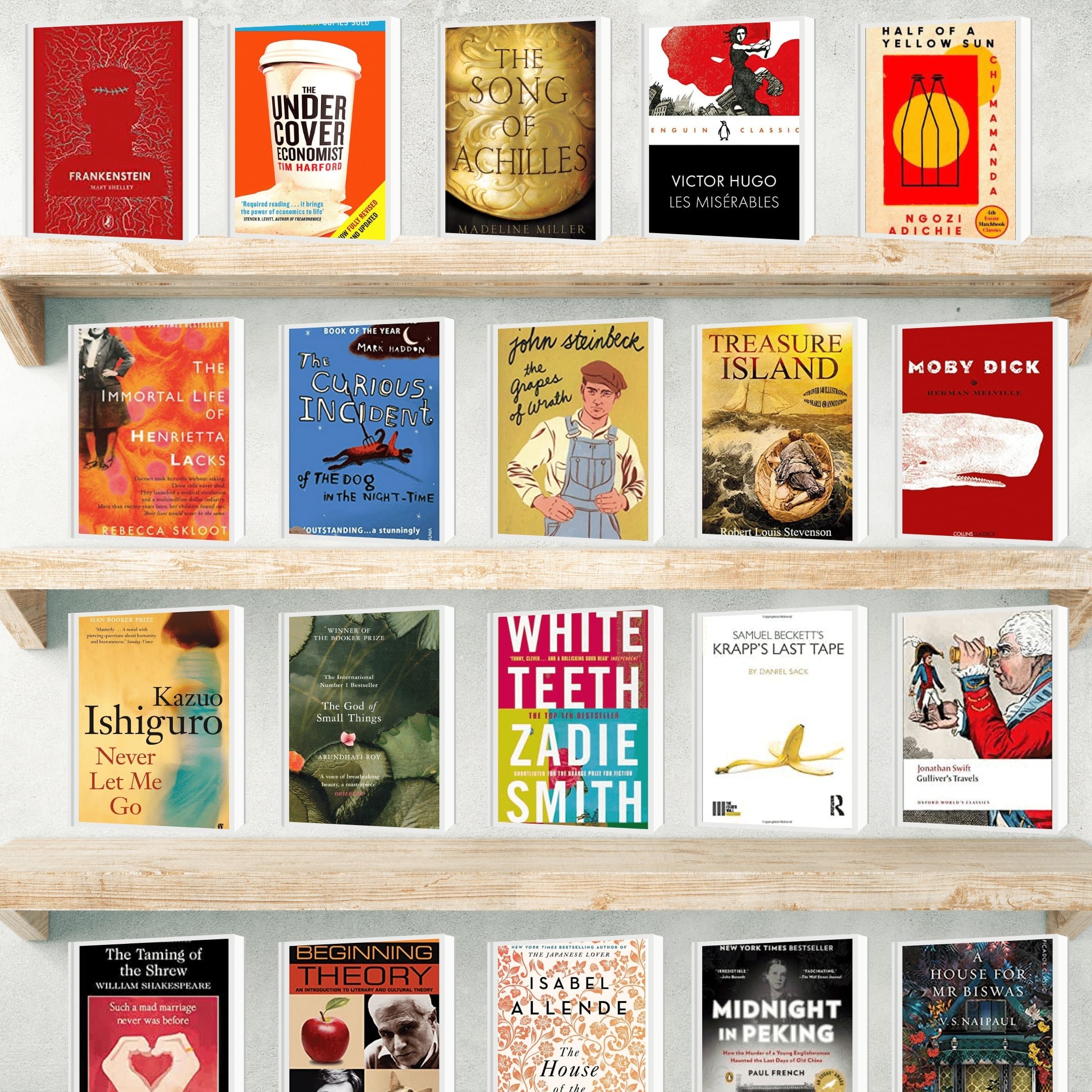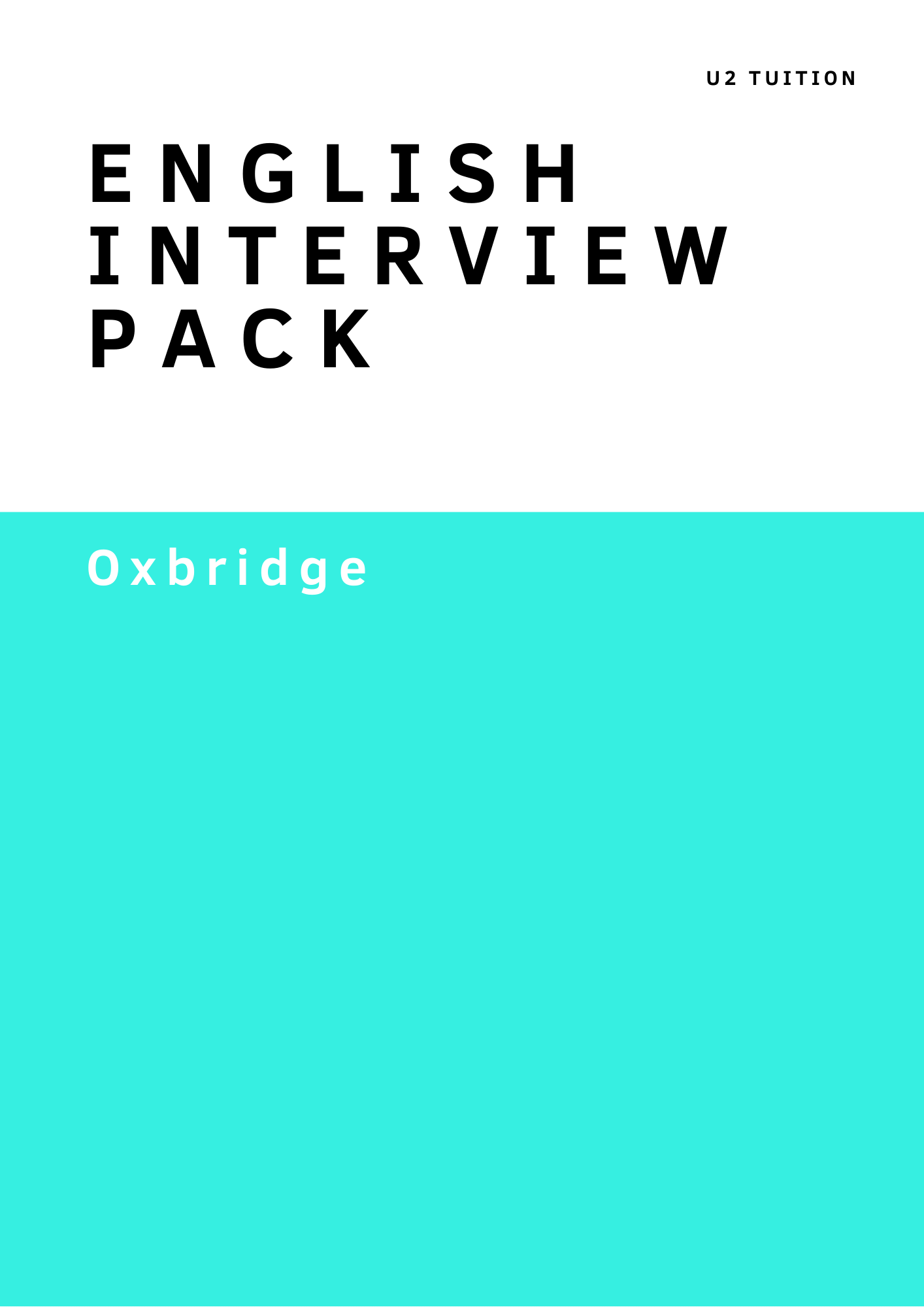English at University in 2025: Personal Statement Tips and More
In this article, U2 Co-founder, Camille (English Language & Literature graduate, University of Oxford) leads you through her top recommendations for successful preparation for studying English at University in 2024, with tips from U2’s Oxbridge-educated English tutors. If you want to know about extracurricular activities to make your application stand-out, current trends and concepts to explore in the subject, book recommendations, English personal statement tips and common Oxbridge English interview questions, this guide is perfect for you!
Applying for English at university?
It’s really important to think of an answer to the question Why English? It is a question you will have to ask yourself numerous times on your application journey: when initially choosing a degree course, when writing your English personal statement, and when preparing for a UCL or Oxbridge English interview. In order to demonstrate your motivation for choosing the course, it might sound obvious, you have to know why you chose it yourself and be sure about what it involves.
Students fall into numerous pitfalls when considering their answer. You may think: “I like reading” - okay, but what do you like reading? Many subjects involve reading, so why English in particular? Do you like reading outside of school? What kinds of books? English is not just about reading and English at university is a far cry from the kind of study that characterises GCSE and A-Level - learning a famous novel or Shakespeare play. The GCSE and A Level syllabuses are prescriptive in comparison to a university course, and offer little scope for exploring works that extend beyond the canon of Western literature. At university, the scope for academically viable research areas are, in fact, endless.
Glance below for an insight into what English at university can offer you and a few reasons you could think about to demonstrate your motivation in your English personal statement and throughout your application:
So what is “English”? - Cambridge University have a great resource called HE+ which offers a definition for your course of application and suggests some useful resources for preparation Think about different forms of texts and genres you might explore, theoretical approaches to literature, how literature intersects with society, culture, history and language...
Consider the interdisciplinary aspect & multi-faceted nature of the subject: Peruse the shelves of a university faculty library and you’ll find books on film criticism, performance art, the intersection of literature and science and psychology, even texts that analyse major graphic novels and comics. This idea is especially heartening for students who don’t feel that the literary canon, in its general exclusion of most female and non-white authors, consistently speaks to and for them, and this allows them to focus on the literary voices that are often tragically sidelined.
Relation to the everyday/ culture: One of the beliefs that an English course quickly instils in you is that there is a smaller distinction between high and low culture than one is led to believe, that Chaucer is as worthy of linguistic analysis as the language of advertising – in fact, the latter is perhaps more socially applicable outside the world of academia. Studying English offers you the opportunity to interrogate not only literary language, but the language of our everyday - indeed, there’s a debate in linguistics over how we differentiate literature from ordinary language - is a receipt poetry? Why isn’t it? Exploring these kinds of questions as part of your application to study English at university gives you a new perspective on the world around you and heightened understanding of the relationship between literature, language and life.
Think about the specific course/s that interest you & why: This is important a) to ensure your course & university choices are right for you, and b) you may well be asked “why this course?” as a UCL or Oxbridge English interview question. Do the department’s lectures, events, and seminars look particularly fascinating? Do any modules particularly interest you? Are there any societies or co-curricular opportunities that appeal to you? Are you excited by the thought of learning from respected academics who have devoted their careers to the very topic they are explaining their cutting-edge research on? The three years you could spend studying for an undergraduate degree in English at university may well be among the most intellectually stimulating of your life if you choose the right course, so spend time on this!
Building your English Personal Statement
It’s really important to showcase a developed interest in English that isn’t just from the classroom. Get involved with the subject in the real world as much as possible. You could:
Write, write, write! Is there a literary magazine at your school? Can you contribute? If not, why not start one!?
Join or start a literary society! Does your school have one? Could you start your own with some friends? Our co-curricular division, Minds Underground, also hosts a wonderful World Literature Club for those aspiring to English degrees, hosted by our Oxbridge English graduates, as well as a Literature Summer School.
Think about attending a literary festival or online event - This is a great chance to listen to an inspiring roster of speakers and meet renowned current authors. Festivals such as the Oxford Literary Festival are wonderful occasions to engage with all things literary. Also keep your eye out for online talks, events & lectures. The British Academy frequently host lectures such as a recent talk by Margaret Atwood and the British Library also frequently hold literary events.
Organise talks - Email authors and ask them to come to speak at your school or host an online lecture. This could be easier than it sounds. (i.e.: look at your school alumni, maybe one of them became a writer!)
Try an English Essay Competition - There are a number of English essay competitions out there, both for creative writing and literary essays. Taking part in an English Essay Competition allows you to demonstrate a wider interest in research and essay writing in your English personal statement. Even if you don’t win, it’s a chance to delve deep into writers / themes of interest, which should help to broaden your literary horizons and encourage you to think critically beyond the A-Level syllabus. Examples:
Minds Underground English Essay Competition - Of course, our very own competition must be the best!
Oxbridge College Essay Competitions - Check out our Minds Underground ‘Top Choice Competitions’ page for a list of the competitions each Oxford and Cambridge college hosts for Year 12 students. Many of our Oxbridge English mentors were prize-winners in these competitions. We also regularly update the page with other great competitions to enter.
Boost your English Personal Statement with Co-curricular Activities
Our co-curricular division, Minds Underground, is dedicated to helping students build evidence of wider subject exploration and pursue their interests.
We host a fantastic array of essay competitions and our Curious Minds mailing list keeps you updated on useful subject reading and resources to expand your English personal statement or prep!
Specialised Work Experience/ Research Projects: You could work on a a project on Modernist renewal with an All Souls College, Oxford scholar, Doctoral researcher & Tutor at Brasenose College, or explore another area of your interest with an expert.
World Literature Masterclasses We run masterclasses in World Literature which are a great way to get introduced to less known works and engage with new perspectives, e.g. “The Overlap Between Violence & Humour in Contemporary British Theatre”
Ideas to Research for your English Personal Statement
‘World Literature’: The recent resurgence of critical interest in “world literature”, reflects the dynamic reconfiguring of a ‘modern’ world in fast motion, propelled by globalisation, changing cultural and aesthetic values and the circulation of commodities. Whilst you will be studying “English” literature at university, there has been a big push to include more texts from around the world, the non-Western world in particular. There is much current debate over how to go about this as meaning can be lost in translation and we often ascribe a sociopolitical aspect to the writer’s work/ assume their intention. How do we work beyond a need for literature to reflect social reality? That said, these debates are important, and the universities are starting to recognise this - Oxford has a third year postcolonial module option for example and a research group centred on Creative Multilingualism. Cambridge also offer a postcolonial and related literatures module in third year and their CRASSH (Centre for Research in the Arts, Social Sciences and Humanities) encourages interdisciplinary research and disciplinary innovation which was created to reflect emerging social and political challenges.
Ideas for preparation: Try to look beyond Western texts when reading beyond your school curriculum. If you are reading in translation, make sure you pay close attention to some of the difficulties at play - think about the effect of translation on the text, what may have been lost in translation, how all readers interpret texts differently…
Approaches to literature: this means looking at a period in literature with relation to gender, history, anthropology, etc. from a novel perspective. Familiarise yourself with some of the big names in theory:
Foucault (His theory of history, of power and discourse)
Marx (Theory of history)
Ferdinand de Saussure/ Jacques Derrida (Structuralism/Deconstruction)
Julia Kristeva/ Judith Butler (Gender theory)
Edward Said (Culture and Imperialism)
Practical Criticism: Practical Criticism involves isolating a text from its history & context. It’s a relatively young discipline started in the 1960’s by Cambridge critic I.A. Richards and other Cambridge pioneers. Whilst Oxford was more historicist in how texts were examined, Cambridge advocated close reading of texts without a socio-political, literary historical or autobiographical context (literature contains its own meaning). In fact, the Oxford English course retains its more historical approach today - students cover each literary period with papers delineated by eras (Romantics, Victorian etc.) in chronological order.
To integrate into your preparation: Unseen texts are central to the admissions process for Oxford and Cambridge, both in the admissions test and at interview. You will most likely not be given the context and will be expected to respond to the text by looking only at the words on the page, using your knowledge of form and technical language to describe the way the text create its effect. At interview, the professor may give you context towards the end of your conversation to see if it adjusts your interpretation. To ensure your literary analysis can stand on its own without knowledge of context, make sure your knowledge of terminology is strong, practise summarising texts and dissecting individual words. Then research the context and see if your opinion changes.
Five Tips for Directing your English Personal Statement Reading:
Read a mixture of texts you simply enjoy for ‘leisure’ (e.g. more contemporary works) and older ‘classics’ or texts that you see as more of an intellectual pursuit.
Try to gain an understanding of major genres and critical and cultural concerns in a few literary periods.
In addition to the primary texts, look to secondary texts (scholarly articles!) to gain more of an understanding of the intellectual background of the period. Read JSTOR articles or books that give you an overview of the period.
Delve deeper into those authors who most appeal to you, thinking about how their works compare, and how they interact with broader concerns.
Explore the “Language” side, especially if applying to Oxford - this will give you a deeper understanding of language, its history and development, its varieties and uses. E.g. Read Peter Barry’s, Beginning Theory: An Introduction to Literary and Cultural Theory or David Crystal’s, The English Language: A Guided Tour of the Language.
Key Literary Eras for your English Personal Statement Prep:
650-1350: Old English & 1350-1550: Middle English: There is absolutely no obligation to dip your toes into Medieval literature, but it can be fun to look at how the English language has developed since then by glancing at the language of Beowulf or Chaucer, for example.
1550-1660 (Renaissance):
Example Writers: John Marston, Christopher Marlowe, Edmund Spenser, Ben Jonson
Themes: Conceptions of language, poetry & religious experience/ Illusion vs reality in art/ Revenge (see revenge tragedies)/ Prose & imitation
1660–1760 (Restoration):
Example Writers: Milton, Marvell, Dryden, Hobbes, Behn, Pope, Defoe, Swift, Richardson, Sterne
Themes/ Genres: Restoration comedy, the rise of the novel, the increased prominence of women writers, epic, mock epic, satire, the periodical essay
1760 - 1830: (Romantics):
Example Writers: Wordsworth, Coleridge, Shelley, Blake, Keats, De Quincy, Radcliffe, Austen
Themes/ Genres: Romantic autobiography, the imagination, travel literature, nature, aesthetics
1830-1910 (Victorian):
Example Writers: Dickens, Rossetti, Brontë’s, Tennyson, Browning, Hardy, Wilde, Darwin
Themes/ Genres: Challenge to religious belief, criticism of the "Mechanical Age", poetry of protest, gender roles, realism, sage writing, the industrial novel, authorship, mystery/ detective novel
1910 - present (Modernism/ Postmodernism):
Example Writers: Forster, T.S. Eliot, James Joyce, Virginia Woolf, Auden, Beckett, Stoppard, Freud
Themes/ Genres: Poetic difficulty, chaos of the post-war world (see theatre of the absurd/ existentialism), female identity
Contemporary:
Example Writers: Chimamanda Ngozi Adichie, Zadie Smith, Simon Armitage, Kazuo Ishiguro
Themes/ Genres: Race, gender & identity, strong class dimension, international conflict, global warming, Digi-Fiction, blurring the boundaries between literature & everyday language, book & film etc., science fiction, crime
Three Tips on what to read for your English Personal Statement:
Read widely and generously.
Think about what areas of language and literature fascinate you most, and start to formulate some ideas that will constitute the starting points for your research interests. These will necessarily evolve over time and over the course of your degree, but it’s good to have an idea of your key interests when applying.
Pick two-three main topics for your English personal statement
Reading widely will allow you to refine your subject interests in preparation for this and allow you to make connections between literary eras and themes in your English personal statement. E.g. My second English personal statement paragraph focused on Gothic literature (17th & 18th Centuries) and the third paragraph linked Ann Radcliffe’s portrayal of her heroines as paradigms of innocence in her gothic novels to the 19th Century works of Elizabeth Gaskell, Christina Rossetti and Oscar Wilde (comparing and contrasting their portrayal). I then discussed the conflict between the way writers depict the private ethics of their female protagonists and the realities of public life in earlier works such as Shakespeare’s Titus Andronicus and the Ancient Greek Tragedy, Medea.
Read from as many literary eras as possible
This will allow you to make interesting and unique connections in your English personal statement. Try to research the context of the period/ any literary movements and compare the style of works. This will also be helpful if you are asked to pinpoint when an unseen text was written and why as part of an Oxbridge English Interview.
What to Expect in a UCL or Oxbridge English Interview:
Personal statement and motivation-based questions e.g. “Why do you want to study a literature-based degree?” or if you mentioned Romeo and Juliet in your personal statement - “Can dramatic tragedy sometimes be read as dramatic comedy?”
Theoretical discussions/ abstract questions on literature e.g. “Why aren’t jokes literature?” or “What will the canon of twenty-first century English literature look like from the perspective of the twenty-second century?”
Unseen extracts: You will likely be given a short text or poem to look at for 10-15 minutes before the interview begins for at least one interview and asked questions on structural/ linguistic features which are interesting, when you think it may have been written and further analysis
Past Oxbridge English Interview questions
Do students of literature need to know about history?
Should we have a literary canon?
Can tragedy transcend time?
Is allusion or imitation stealing?
Do writers always draw from experience?
Does a text transcend the intention of its author?
Have we, as viewers, internalised the filmic conventions of different genres?
If you’d like more help preparing for an Oxbridge English Interview, have a look at our Oxbridge English Interview pack, with guidance, the experience and advice of successful applicants and over 50 additional past Oxbridge English Interview questions.
Preparing for English at university is all about allowing yourself to exercise and deepen your intellectual curiosity. You aren’t expected to have an understanding of absolutely every period or theoretical approach, and your preparation should be about exploring what you enjoy, not about ticking boxes & pre-empting what you think the interviewer will be impressed by. Remember, all texts have their own merit, whether you are reading canonical authors such as Shakespeare, Chaucer, Milton, Joyce, et al., or a verse of rap. You could use the latter to explore a huge range of ideas such as the language of community/solidarity, language as tool with which speaker can create/alter his position/identity etc. Doing so would give your application originality. Investigate any text that catches your attention and equip yourself with the necessary analytical tools that will allow you to present a complex and rich interpretation or partake in a critical discussion.
How Can U2 Help Prepare You For Your Oxbridge/ Top Russel Group University English Application?
Looking for GCSE, A-Level or IB English Language and Literature support? Need help planning & writing your English personal statement? Preparing for the ELAT (see blog) or Oxbridge / UCL English interview? We have a large team of wonderful English mentors, all educated at Oxford and Cambridge, who are well-placed to support. We offer either ad hoc tuition or you are welcome to join one of our wider Oxbridge Mentoring programmes (book a free consultation to discuss options).
The Oxbridge Mentoring Process:
1) We suggest an Oxford or Cambridge English graduate as a mentor (you may state your preference) and send their full CV for review. Many of our mentors have studied at Master’s or PhD level/ have supported other successful applicants, and are deeply familiar with the admissions process to study English, including entrance exam requirements and the interview process.
2) We typically suggest beginning with a 1.5 hour informal assessment/ taster session, where the mentor will informally assess the student’s current performance level for test and interview. Following this, we issue a report with feedback, and structure a plan to best prepare.
3) U2’s approach for regular mentoring sessions: In sessions, students are expected to orally communicate, defend, analyse & critique ideas or solve problems, in conversation with the tutor, as in an Oxbridge tutorial. This readies students for the challenging entry process and provides them with the tools needed to stand out amongst other strong candidates. We offer some of the most comprehensive support available at present, with an entire interactive online platform, Minds Underground, built to take care of all students' co-curricular needs in preparation for university application and future careers, including research projects, masterclasses and summer schools.
Sessions from £70/h.






